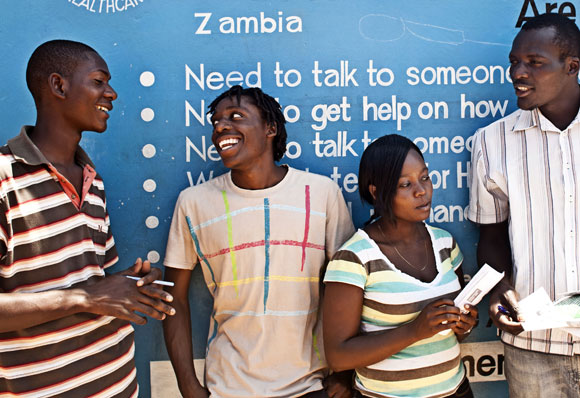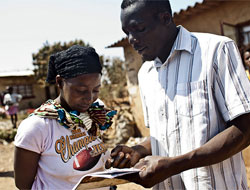Population has become a dirty word.
It is a word that many of my predecessors and counterparts have, some might say understandably, steered clear of for decades. That's because it is normally followed by words like 'control' and 'explosion'. It conjures images of forced euthanasia and sterilisation at one extreme or famine, poverty, disease and war at the other.
But as the world's population reaches seven billion - with the number of babies born each month equal to the population of Portugal - now is the time to start talking about it.

Some people will say we're heading for a vast human tragedy if growth continues at the current rate. Others will say we'll cope and that the rising population is simply proof of increasingly sophisticated developments in medicine, agriculture and technology.
It is not for me - or anyone - to tell you how many children to have as that is your choice. And providing choice for women has been my priority since starting this job. In fact, one of my first acts as Development Secretary was to authorise a shipment of condoms to Uganda.
This is partly because lack of choice is such a significant factor in rapid population growth. Millions of unintended pregnancies occur every year; yet at the same time 215 million women who desperately want to delay or avoid pregnancy are unable to do so.
When I was at a health centre in Rwanda, women shed tears of joy and cheered when they discovered they weren't expecting because, for some of these women, pregnancy can amount to a death sentence.
A woman dies in pregnancy or childbirth every two minutes - 99% of them in the developing world. Most of those who do survive are left trapped in poverty, ahead of them a lifetime of struggling to provide food, water, healthcare and education for their children.

For the many millions of girls who are still children themselves, pregnancy inevitably means giving up school and any chance of the education that would allow them to support themselves and their family in years to come. This pattern will continue unless action is taken to provide universal access to reproductive health and family planning services.
That's why over the next four years, British support will make it possible for at least ten million more women to use modern methods of family planning so that they can decide for themselves whether, when and how many children to have. We will also help to prevent more than five million unintended pregnancies and to save the lives of at least 50,000 women during pregnancy and childbirth and a quarter of a million newborn babies.
As a result of these measures, fewer girls will have to leave school because they're pregnant, something that has significant health implications in itself: a girl who has completed her education typically marries four years later and has two fewer children.
In short, family planning is excellent value for money. The relevant services, including the provision of contraception, cost on average under £1 per person per year - far less than treating the complications of an unintended pregnancy or investing in additional services to provide health care and education for a burgeoning population.
The Government of Tanzania, for example, estimates that it will need 131,000 fewer teachers by 2035 if fertility declines - saving millions of pounds in the long run.
Giving girls and women the choice to decide whether, when and how many children they have means fewer women die in childbirth and the poorest families can make what little they have go further.
Family planning is a smart, simple and extremely cost effective investment of aid. It is at the centre of all our development work and we are going to ensure more women are given the choices they rightly deserve.
UK aid is helping the world's poorest people to change their lives by enabling at least ten million more women to use modern family planning and prevent five million unintended pregnancies. Helping couples plan their families means they can give their children a better chance in life.
Find out more about what DFID is doing, in our feature on 'A World at 7 Billion'
This article first appeared on the Huffington Post website.


5 comments
Comment by pgangadharanpulingat posted on
Kerala state in india is a rollmodel for family planning voluntarily adopted by the people and very good progress is achieved in human development . Sufficient opportunities are getting to the newborn children from play school to plus two examination . Through the hundreds of village anganvadis the little ones get proper nutrition food and playing articles . The trained anganvadi workers are dedicated selfless volunteers who cares the children which ultimately helps to nurture the little babies to a responsible little ones ready for primary education.The state government by its properplanning by the aid of central government funds shows better results which is a model for other states to implement. Kerala having high literacy and conscious mind are adopting family planning methods without hindering to health of mothers.
Comment by Jose Rene G. Tijam posted on
Contraception does not solve the world's problems on hunger and poverty. Take note that 36% or more than a third of the world's population of 7 billion today consists of only TWO countries, China (1.3 billion) and India (1.2 billion). This fact should be sufficient to calm alarmists down with excitement that the world is overpopulated.
Therefore, the population density is more of poor zoning and shelter planning for urban areas in major cities of the world rather than the poor family planning blamed on "irresponsible" parents.
God made humans the physical bodies that provide for fertile periods for the woman and infertile periods for the woman and her husband to enjoy unhampered sex without any fear of pregnancy.
How about taking a closer look at this natural fact? Man has devised ways and invented medical breakthroughs opposed to the divinely-created natural reproductive systems.
Comment by MALALA PAULO S.M. posted on
REGARDING DEVELOPING COUNTRIES TRENDS OF POPULATION GROWTH WHICH IS HIGHLYN INCREASINFG, I RECOMMENT 1/10 OF THESE COUNTRYS' BUDGET SHOULD BE SET ASIDE FOR FAMILLY PLANNING CAMPAIGN. IN ORDER THAT IN FUTURE THESE COUNTRIES HAVE TO EXPERIENCE FERTILITY DECLINE (ESPECIALLY IN TANZANIA).
FERTILITY DECLINE IN TANZANIA FOR EXAMPLE IMPLIES FUTURE SAVING OF RESOURCES FOR MORE INVESTMENT IN PRODUCTIVE SECTORS AND SOCIAL SERVICES INFRASTRUCTURES AT WHICH ITS SPIRAL OVER EFFECTS IS DEVELOPMENT AND IMPROVEMENT OF WELLBEING OF THE PEOPLE.
By Malala Paulo S.M., Economist at Iringa Municipal Council - IRINGA TANZANIA.
Comment by Rachel Kasumba posted on
Both population growth and decline have advantages and disadvantages that have become subjects of concern and debate everywhere. Depending on the location, family economic circumstances, education level, religious views, cultural practices, politics, etc, there are varying opinions regarding population and whether to control it or not.
Some of the dvantages of population growth include:-
1) "A buyer is born every minute" quote often attributed to P. T. Barnum (1810 - 1891), that has spurred many entrepreneurs and organizations to view increased population growth as good for business. Many argue that instead of viewing this as a negative trend, we should embrace the perceived benefits of these potential buyers of goods and services. Hence, more people are actually more of an asset (source of revenue and profits) than a liability (cost and expenses). It is hoped that the increase in population and subsequent costs will be more than offset by the benefits accruing from the same.
2) Already, there is widespread anxiety as regards social security related issues in countries with declining populations especially in the West - mostly Europe and South East Asia. Concern is being raised as to who is going to take care of the aging population both physically and economically as young people have been delaying or foregoing child bearing.
3) To mitigate the effects of #2 above, some supporters of globalization argue that the increase in population in some countries will force people, products, and services to migrate to where they are in scarcity and so balance the problem of regional over- and under-population
4) Advocates of the need to ease immigration policies also say that this will mean that resources will be more efficiently distributed due to reason # 3.
Some of the disadvantages of population increase include:-
1) Rural Urban Migration - leading to congestion, slums and ghettos populations across the globe, increased crime as most people cannot find work in the cities, food insecurity as most people who would have tended to farming opt for the uncertainties of urban life instead.
2) Strain on available social services and infrastructure, because as discussed in the blog article, the less educated and poorer families are more likely to get more children that they can't support financially. These same families are less likely to afford to migrate to better economies that will afford them free access to education, health, etc.
3) It is precisely for preceding reason #2 above, that has led to a lot of developed countries deciding to tighten their borders through stricter immigration policies to discourage economic migration.
Comment by Mustapha Saddiq posted on
Hi...ID sec
I believe you are doing great and good job especially in issues like this that are very complicated and worrisome especially in the developing countries -which I believe comprises a large percentage of the world population.
But sir, if I may ask; what are your planes in the countries like 'Nigeria' the country with the highest population in the continent?